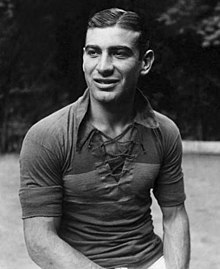
Back فرانسيسكو فارايو Arabic فرانسيسكو فارايو ARZ Fransisko Varalyo Azerbaijani Francisco Antonio Varallo Catalan Francisco Varallo Czech Francisco Varallo Danish Francisco Varallo German Francisco Varallo Spanish فرانسیسکو وارایو Persian Francisco Varallo Finnish
 Varallo in 1935 | |||||||||||||||||||||||
| Personal information | |||||||||||||||||||||||
|---|---|---|---|---|---|---|---|---|---|---|---|---|---|---|---|---|---|---|---|---|---|---|---|
| Full name | Francisco Antonio Varallo | ||||||||||||||||||||||
| Date of birth | 5 February 1910 | ||||||||||||||||||||||
| Place of birth | La Plata, Argentina | ||||||||||||||||||||||
| Date of death | 30 August 2010 (aged 100) | ||||||||||||||||||||||
| Place of death | La Plata, Argentina | ||||||||||||||||||||||
| Position(s) | Inside-right | ||||||||||||||||||||||
| Youth career | |||||||||||||||||||||||
| 12 de Octubre | |||||||||||||||||||||||
| Estudiantes LP | |||||||||||||||||||||||
| Gimnasia y Esgrima LP | |||||||||||||||||||||||
| Senior career* | |||||||||||||||||||||||
| Years | Team | Apps | (Gls) | ||||||||||||||||||||
| 1928–1930 | Gimnasia y Esgrima LP | ? | (36) | ||||||||||||||||||||
| 1930–1931 | → Vélez Sársfield (loan)[note 1] | ? | (16) | ||||||||||||||||||||
| 1931–1939 | Boca Juniors | 222 | (194) | ||||||||||||||||||||
| International career | |||||||||||||||||||||||
| 1930–1937 | Argentina | 16 | (7) | ||||||||||||||||||||
| Managerial career | |||||||||||||||||||||||
| 1957-1959 | Gimnasia y Esgrima LP | ||||||||||||||||||||||
Medal record
| |||||||||||||||||||||||
| *Club domestic league appearances and goals | |||||||||||||||||||||||
Francisco Antonio "Pancho" Varallo (Spanish pronunciation: [fɾanˈsisko anˈtonjo ˈpantʃo βaˈɾaʝo]; 5 February 1910 – 30 August 2010) was an Argentine football forward. He played for the Argentina national team from 1930 to 1937, also representing the country at the inaugural FIFA World Cup in 1930.
During his career, Varallo won four Primera División titles (one with Gimnasia y Esgrima LP and three with Boca Juniors) and with 194 goals in 222 official matches, is Boca Juniors' 3rd. highest all-time leading goalscorer.[2][3][4] Besides, Varallo is placed 11th. among the all-time Argentine Primera División top scorers with 216 goals.[5]
Varallo died in his home-town of La Plata on 30 August 2010, aged 100. He was the last surviving player from the 1930 World Cup.[6]
- ^ American Trip of Vélez Sarsfield 1930/31 by Pablo Ciullini on the RSSSF
- ^ "Football glory Francisco Varallo dies at age 100". Buenos Aires Herald. Archived from the original on 9 September 2010. Retrieved 31 August 2010.
- ^ Cite error: The named reference
loscincowas invoked but never defined (see the help page). - ^ Francisco Varallo biography on Historia de Boca
- ^ Francisco Antonio Varallo – Goals in Argentina League
- ^ "El gol está de luto". Olé (in Spanish). 30 August 2010. Archived from the original on 7 September 2017. Retrieved 30 August 2010.
Cite error: There are <ref group=note> tags on this page, but the references will not show without a {{reflist|group=note}} template (see the help page).